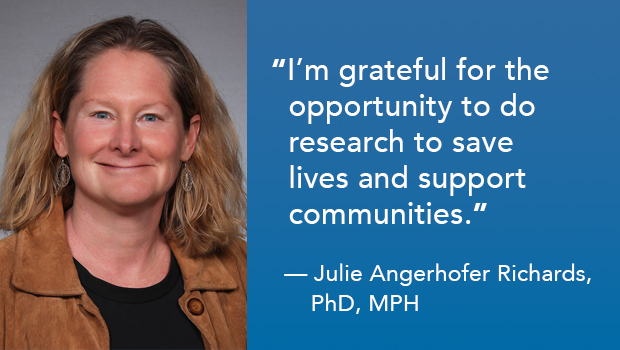Kaiser Permanente expands gun violence prevention work

Equity-focused research by Julie Angerhofer Richards, PhD, MPH, is among the work supported by $3.2 million in funding
Julie Angerhofer Richards, PhD, MPH, will receive research support from the Kaiser Permanente Center for Gun Violence Research and Education for her work on firearm suicide prevention. The award recognizes Richards’ exemplary leadership in research collaborating with people with lived experience with firearms and with gun violence. Richards was also recently honored with the Puget Sound Business Journal's Researcher of the Year award for 2023.
"The patients and clinicians we’ve interviewed over the last several years generally support practices to prevent firearm injury," said Richards, an assistant investigator at Kaiser Permanente Washington Health Research Institute. “Those who have experienced losing a loved one or are experiencing suicidal thoughts themselves often have really helpful suggestions.”
Interactions with health care can be a critical opportunity for prevention because most people who die by suicide see a medical professional in the year before death.
The Center for Gun Violence Research and Education awards were announced in September 2023. The center is providing $3.2 million in funding to 7 researchers, 3 national organizations, and 10 community-based organizations that are pursuing innovative approaches to preventing gun violence that prioritize health equity. Research by the awardees, including Richards, includes the experiences and expertise of communities that are particularly affected by gun violence.
Gun violence is currently the leading cause of death for U.S. children and teens, according to the Centers for Disease Control and Prevention. More than 45,000 people die annually in the U.S. because of gun violence. The Center for Gun Violence Research and Education, with the Health Alliance for Violence Intervention, works to find actionable, equitable solutions to the gun violence epidemic, including by supporting researchers at Kaiser Permanente and in communities.
A record of patient-focused firearm and suicide research
Kaiser Permanente previously recognized and supported Richards' research. One of the first competitive grants from the Kaiser Permanente Firearm Injury Prevention Task Force, Office of Community Health, funded her studies on integrating firearm suicide prevention into primary care. Her research examined ways for Kaiser Permanente Washington health care teams to ask patients about firearm access nonjudgmentally, with respect for privacy.
Much of Richards' research is in close collaboration with Kaiser Permanente Washington clinical partners, including Rebecca Parrish, LICSW, administrator of clinical operations for Mental Health and Wellness Support Services.
Ongoing projects by Richards and team, with collaborators from Kaiser Permanente and across the country, include:
- Integrating “Lock To Live” — an aid to help people make decisions about safe firearm storage — into routine care to support people at risk of suicide in reducing access to lethal means such as firearms
- Using interviews and statistical methods to inform how to include risk-prediction models in health care to support patient-centered suicide risk identification
- Using community-based participation to create and pilot ways to optimize firearm suicide prevention in health care, including among Alaska Native and American Indian people
A motivating legacy
Richards is open about what motivates her research: Her mom died by firearm suicide in 2010.
Researchers don't often share personal and painful experiences that are relevant to their work, she said. But personal experiences affect everyone's perspectives, including researchers’. By sharing hers, Richards demonstrates the importance of listening to people with lived experience — a value that infuses her work, which is always in collaboration with clinical partners and members of the communities they serve.
"I'm grateful for this opportunity to expand research on firearm suicide prevention," Richards said. "It’s an exciting time to be doing this work. I look forward to learning from my fellow grantees doing innovative work that will save lives and support communities disproportionately impacted by gun violence.”
By Chris Tachibana
Suicide prevention

Most mental health patients answer firearm question
Study shows patients will usually answer a question about firearm access, providing key information for suicide prevention.
Researcher profile

4 questions for a suicide-prevention researcher
Julie Richards, PhD, MPH, just published the first paper from a Kaiser Permanente program on firearm injury prevention.



